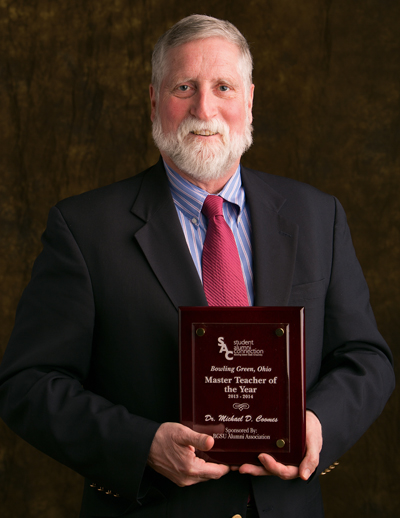Master Teacher Michael Coomes views teaching as learning
BOWLING GREEN, O.—According to Dr. Michael Coomes, winner of the 2014 Master Teacher Award at Bowling Green State University, the most important quality for a teacher is careful listening.
 “As a teacher I must listen to myself, constantly checking and rechecking what I have said against what I know about the subject matter and what I want students to learn that day,” said Coomes, an associate professor of higher education and student affairs. “Of equal importance, I must listen to my students so I understand how they are constructing knowledge that will serve them as they grow and mature as professionals. Finally, I must listen to their ideas and questions so I can help them clarify their thinking and so I can learn along with them.”
“As a teacher I must listen to myself, constantly checking and rechecking what I have said against what I know about the subject matter and what I want students to learn that day,” said Coomes, an associate professor of higher education and student affairs. “Of equal importance, I must listen to my students so I understand how they are constructing knowledge that will serve them as they grow and mature as professionals. Finally, I must listen to their ideas and questions so I can help them clarify their thinking and so I can learn along with them.”
That careful listening is one of the qualities that have earned him the respect and affection of his students and their naming him a Master Teacher – the highest award presented to faculty. Coomes was honored at the Faculty Excellence Awards April 16. He received a $1,000 check, presented by the Student Alumni Connection
One of Coomes’s nominators, Ashley Brown, a first-year graduate student in College Student Personnel from Houston, recalled, “When he sensed I wasn’t getting it, he would pull me aside and make sure I understood what we’d been discussing.
“As a first-year student I was very nervous about coming into graduate-level classes and achieving my goals. He was so inspiring and motivated me to work hard.”
Brown will have an internship in California this summer, thanks in part to the encouragement of Coomes.
Coomes frequently employs personal stories and jokes in his teaching, she said. This makes even something as seemingly dry as the history of student affairs interesting.
“He always makes us see why what we’re doing is important,” Brown said.
Coomes brings his recent research into student affairs history to the classroom in creative ways.
“In my Introduction to Student Affairs class, I have instituted a historical scavenger hunt in which students are given the names of events, people, organizations, legal decisions, etc., that have occurred during the last 100 years of student affairs history,” he said. “Students must research their individual hunt items, and then work with peers in small groups to develop a narrative for their era of the student affairs profession. Students are encouraged to use multiple forms of media (photographs, sound recordings, YouTube videos, etc.) in developing their descriptions.”
Coomes also models the ideal of being a lifelong learner. “My philosophy of teaching is much more a philosophy of learning for I truly believe it is the role of the teacher to engage with students in the learning process,” he said. “Learning is a cooperative process that involves both teacher and student collaborating to construct meaning. It is the teacher's responsibility to build learning communities; communities that encourage teamwork, that foster learning inside and outside the classroom, and that encourage students and teachers to expand their horizons beyond the parochial, the comfortable, and easily agreed upon. Finally, I believe that learning requires reflection and connection; learners must be provided with ample opportunities to reflect on what they have learned and to apply that newly owned knowledge to their lives in personally meaningful ways.
“I teach in an applied field and have the luxury of working with motivated, curious (generally), and committed graduate students. My greatest satisfaction comes when I attend a professional conference and encounter one of my former students who has assumed important responsibilities on a college campus as an administrator and educator.”
Updated: 12/02/2017 12:51AM
